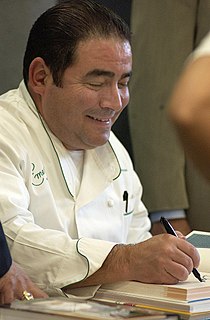A Quote by Joel Fuhrman
The human diet, for millions of years, did not contain any added salt - only the sodium present in natural foods, adding up to only about 1000 mg sodium per day.
Related Quotes
The ideal human diet looks like this: Consume plant-based foods in forms as close to their natural state as possible (“whole” foods). Eat a variety of vegetables, fruits, raw nuts and seeds, beans and legumes, and whole grains. Avoid heavily processed foods and animal products. Stay away from added salt, oil, and sugar. Aim to get 80 percent of your calories from carbohydrates, 10 percent from fat, and 10 percent from protein.
My understanding about nutrition is not what I'd like it to be, so for a long time my dieting strategy was very crude. It's only very recently that I started to accept different ideas like using vegetables and natural seasonings that don't compromise the sodium and caloric value of the food while at the same time giving it some flavor. I'm still evolving; everybody is or at least should be in bodybuilding.
When I was 88 years old, I gave up meat entirely and switched to a plant foods diet following a slight stroke. During the following months, I not only lost 50 pounds, but gained strength in my legs and picked up stamina. Now, at age 93, I'm on the same plant-based diet, and I still don't eat any meat or dairy products. I either swim, walk, or paddle a canoe daily and I feel the best I've felt since my heart problems began.
We believe in the Three Rs - reducing the consumption of meat and other animal-based foods; refining the diet by eating products only from methods of production, transport, and slaughter that minimize pain and distress; and replacing meat and other animal-based foods in the diet with plant-based foods.


































